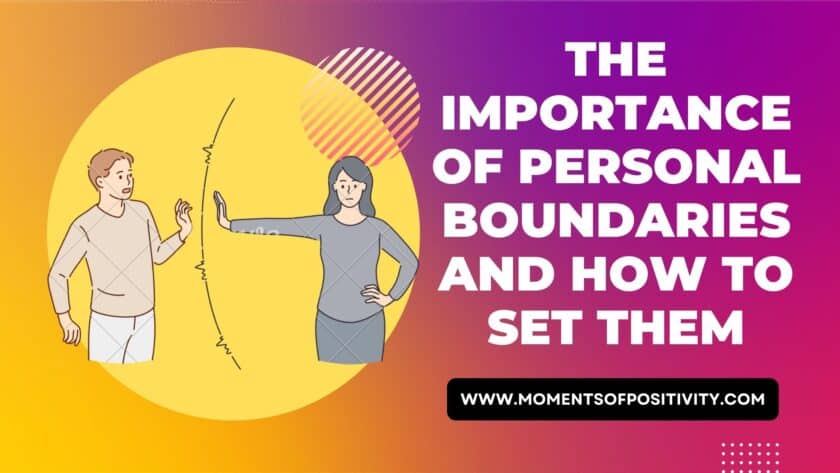Share this
While most people wouldn’t think twice about the idea of having personal boundaries, many don’t think much about what they are or why they’re important to have. Personal boundaries define your limits as an individual and give you a clear picture of what you’re comfortable with and what you’re not, both in your own life and in interactions with others. Once you learn how to set personal boundaries, you can go on to reap their many benefits and help yourself and others lead happier, more fulfilling lives.
Defining personal boundaries
Personal boundaries are a way of telling other people what you will accept from them. When your boundaries are too wide, you may feel taken advantage of or overwhelmed by the demands placed on you. Setting appropriate personal boundaries can be difficult for some people but not for others.
Some people may find it easier because they have a strong sense of themselves and know what they need from others to feel safe. Others may find it difficult because they are used to accommodating everyone else’s needs without considering their own.
The importance of setting boundaries
It is so important to have personal boundaries and to know how to set them. Without personal boundaries, we can end up feeling overwhelmed, take advantage of it, and even put ourselves in potential danger. Personal boundaries protect us from becoming too invested in other people’s lives and from letting others become too invested in ours. They also help us to stay healthy emotionally and mentally. They provide us with a sense of safety and control over our bodies and minds.
When we have healthy boundaries, we can assert ourselves in relationships and interactions. We can say “no” when we need to, and “yes” when we want to. Unfortunately, not everyone respects personal boundaries. Some will take advantage of our good nature, or simply do not understand the concept. This is why it is so essential for us to learn how to set our boundaries. Developing our own boundaries means that we are taking responsibility for ourselves and our well-being. It means setting limits on what we will tolerate from others, and establishing clear consequences if those limits are crossed. It also means being honest with ourselves about what we can handle, and what we need help with. They help us to respect ourselves and others.
How To Set Personal Boundaries
Personal boundaries are important because they help us to stay healthy and safe in our relationships. They help us to know when we are being treated well and when we need to speak up for ourselves. Setting personal boundaries is not always easy, but it is worth it. Here are some tips for how to set personal boundaries:
- Know your wants and needs. This is the first step to setting any boundary. You need to be clear with yourself about what you want and need in a given situation.
- Communicate your wants and needs clearly to others. This can be difficult, but it is important to be assertive about your needs. If you are feeling uncomfortable, say so directly.
- Be willing to compromise. Not every situation will be perfect, but you should always try to find a solution that works well for everyone involved.
- Set limits and stick to them. If someone crosses a boundary that you have set, be firm in enforcing it. It is okay to say “no” or “stop”. If someone is constantly asking you for favors that you don’t want to do, let them know that you’re not going to keep saying yes just because you feel bad about saying no.
- Respect other people’s boundaries as well. Just as you deserve to have your own personal space and autonomy, so does everyone else around you.
How To Say “No” In A Firm But Friendly Way
It can be difficult to say “no” without feeling guilty, but it is important to be firm and honest when necessary. Here are a few tips:
- Keep your explanation short and sweet. There’s no need to go into detail or apologize profusely. Just state your reason for saying “no” clearly and concisely.
- Use “I” statements. For example, instead of saying “You’re being unreasonable,” try “I’m sorry, but I can’t do that.” This will help the other person feel heard and respected.
- Be assertive, not aggressive. There’s a difference between being firm and being rude. Make sure your tone is polite and respectful even as you stand your ground.
- Offer an alternative solution, if possible. If you’re unable to do what the other person is asking, see if there’s something else you can offer instead.
- Thank the other person for understanding. Even if they don’t seem happy about your answer, thanking them for their understanding shows that you appreciate their efforts.
What Happens Without Boundaries?
It’s important to have personal boundaries in order to maintain a healthy lifestyle and relationship with others. Without boundaries, we can become physically and emotionally exhausted from giving too much of ourselves. We can also end up in harmful or toxic situations. Setting boundaries is not about being selfish or unkind, it’s about taking care of yourself and respecting others. It’s okay to say “no” when you don’t have the energy or time for something. It’s okay to put yourself first sometimes. And it’s okay to set limits on how much you’re willing to give of yourself. Creating healthy boundaries is an essential part of taking care of yourself and your relationships. If you’re not sure where to start, talk to a therapist or counselor who can help you identify your needs and set appropriate boundaries.
Conclusion
In conclusion, it is important to have personal boundaries in order to maintain healthy relationships with others. Personal boundaries can be set in a variety of ways, such as by communicating your needs and expectations to others, setting physical boundaries, and boundary-setting practices. By understanding and implementing personal boundaries, you can improve your relationships with others and lead a healthier and happier life.



